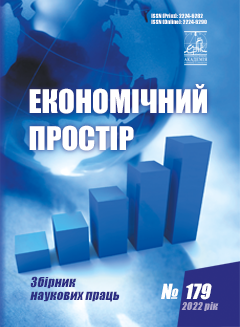ІНФОРМАЦІЙНЕ ЗАБЕЗПЕЧЕННЯ УЧАСНИКІВ ВЕРТИКАЛЬНО ІНТЕГРОВАНИХ СТРУКТУР ФРАКТАЛЬНОГО ТИПУ В АГРОБІЗНЕСІ
Анотація
Одним із типів вертикально інтегрованих бізнес-структур із залученням суб’єктів агробізнесу, який дає можливість зберегти самостійність прийняття рішень та автономність членів об’єднання, є фрактально організовані вертикально інтегровані структури, до яких входять учасники ланцюга створення доданої вартості агропромислової продукції. Серед ключових особливостей функціонування таких об’єднань є високий рівень інформаційного забезпечення та рівноправний доступ їх членів до необхідних даних. Переважна більшість досліджень проблематики фрактальної організації бізнесу стосується сфери промисловості, тоді як саме аграрний сектор, по-перше, набуває всіх характеристик сучасних об’єднань, що мають ознаки бізнес-структур фрактального типу та, по-друге, здатні забезпечити позитивні ефекти, що властиві саме такій формі організації бізнесу. Що ж стосується питання інформаційного забезпечення у межах вертикально організованих аграрних бізнес-системи, то воно є практично не дослідженим, зокрема, через специфічність організації мережевої взаємодії учасників вертикально інтегрованих структур фрактального типу в агробізнесі. У даному дослідженні проведено аналіз бізнес-процесів у межах фрактально організованих вертикально інтегрованих структур, побудовано відповідні функціональні моделі. Базуючись на ключових принципах системного аналізу, ідентифіковано інформаційні потоки для кожного із учасників об’єднання. Розроблено схему інформаційної мережі фрактального об’єднання відповідно до основних критеріїв оцінки захищеності інформаційних обчислювальних систем.
Посилання
M. Hendrickson, H. James, and W. Heffernan, "Vertical Integration and Concentration in US Agriculture", Encyclopedia of Food and Agricultural Ethics, 2018, 1, pp. 1–9.
О. Ю. Попова, Н. Ю. Ляшок, та К. С. Ласкавець, "Вертикально-інтегровані структури в аграрному секторі та причини їх створення", Наукові праці ДонНТУ. Серія : Економічна, 2019, № 2(21), с. 57–64.
Ю. Соловей, "Особливості поширення інтегрованих структур в аграрному секторі економіки України", Аграрна Економіка, 2016, Т.9, № 3-4. с. 68–73.
I. Bider, E. Perjons, M. Elias, and P. Johannesson, "A fractal enterprise model and its application for business development", Softw Syst Model, 2017, vol. 16, pp. 663–689.
I. Bider, E. Perjons, and M. Elias, "Untangling the Dynamic Structure of an Enterprise by Applying a Fractal Approach to Business Processes", PoEM, 2012, LNBIP, vol. 134, pp. 61–75.
M. Canavesio, and E. Martinez. "Enterprise modeling of a project-oriented fractal company for SMEs networking", Computers in Industry, 2007, vol. 58.8-9, pp. 794-813.
P. Piciocchi, C. Bassano, M. Kirikova, J. Makna, and J. Stecjuka, "Managing Change in Fractal Enterprises and IS Architectures from a Viable Systems Perspective", International Conference on Business Informatics Research, 2011, pp. 38-50.
А. Д. Воробьев, "Фрактальный подход в методологии стратегического управления", Менеджмент в России и за рубежом, 2017, № 5, с. 3–11.
Т. О. Загорна, "Дослідження конкурентного процесу в галузі: синтез фрактальних характеристик і процедур", Європейський вектор економічного розвитку : науковий журнал, Дніпропетровськ, 2014, с. 70–81.
O. Skydan, O. Nykolyuk, O. Chaikin, and V. Shukalovych, "Concept of fractal organization of organic business systems", Agricultural and Resource Economics, 2021, 7(2), pp. 59–76.
J. Raye, "Fractal Organization Theory", International Journal of Organizational Transformation and Social Change, 2014, 11 (1). p. 50–68. URL: http://journals.isss.org/index.php/proceedings56th/article/view/1796. (дата звернення: 10.02.2022).
О. М Николюк, "Передумови застосування фрактального підходу в організації суб’єктів аграрного бізнесу", Економіка АПК, 2018, № 6, с. 67–75.
K. Sandkuhl, and M. Kirikova, "Analysing enterprise models from a fractal organisation perspective-potentials and limitations", In: Proceedings of PoEM, 2011, LNBIP, vol. 92, pp. 193–207.
Trusted Computer System Evaluation Criteria. URL: https://csrc.nist.gov/csrc/media/publications/conference-paper/1998/10/08/proceedings-of-the-21st-nissc-1998/documents/early-cs-papers/dod85.pdf/. (дата звернення: 18.02.2022).
The Common Criteria. URL: https://www.com-moncriteriaportal.org/. (дата звернення: 18.02.2022).
Hendrickson M., James H., Heffernan W. (2018) Vertical Integration and Concentration in US Agriculture. Encyclopedia of Food and Agricultural Ethics, vol. 1, pp. 1–9.
Popova O. Yu., Lyashok N. Yu., Laskavets K. S. (2019) Vertykalʹno-intehrovani struktury v ahrarnomu sektori ta prychyny yikh stvorennya [Vertically integrated structures in the agricultural sector and the reasons for their creation]. Naukovi pratsi DonNTU. Seriya : Ekonomichna, no. 2(21), pp. 57–64.
Solovey Yu. (2016) Osoblyvosti poshyrennya intehrovanykh struktur v ahrarnomu sektori ekonomiky Ukrayiny [Features of the spread of integrated structures in the agricultural sector of Ukraine's economy]. Ahrarna Ekonomika, 2016, vol. 9, no. 3-4. pp. 68–73.
Bider I., Perjons E., Elias M., Johannesson P. (2017) A fractal enterprise model and its application for business development, Softw Syst Model, vol. 16, pp. 663–689.
Bider I., Perjons E., Elias M. (2012) Untangling the Dynamic Structure of an Enterprise by Applying a Fractal Approach to Business Processes, Proceedings of PoEM, LNBIP, vol. 134, pp. 61–75.
Canavesio M., Martinez E. (2007) Enterprise modeling of a project-oriented fractal company for SMEs networking, Computers in Industry, vol. 58, pp. 794-813.
Piciocchi P., Bassano C., Kirikova M., Makna J., Stecjuka J. (2011) Managing Change in Fractal Enterprises and IS Architectures from a Viable Systems Perspective, International Conference on Business Informatics Research, pp. 38-50.
Vorobev A. D. (2017) Fraktalnyiy podhod v metodologii strategicheskogo upravleniya [Fractal approach in the methodology of strategic management]. Menedzhment v Rossii i za rubezhom, no. 5, pp. 3–11.
Zahorna T. O. (2014) Doslidzhennya konkurentnoho protsesu v haluzi: syntez fraktalʹnykh kharakterystyk i protsedur [Research of the competitive process in the field: synthesis of fractal characteristics and procedures]. Yevropeysʹkyy vektor ekonomichnoho rozvytku : naukovyy zhurnal, Dnipropetrovsʹk, pp. 70–81.
Skydan O., Nykolyuk O., Chaikin O., Shukalovych V. (2021) Concept of fractal organization of organic business systems, Agricultural and Resource Economics, no. 7(2), pp. 59–76.
Raye J. (2014) Fractal Organization Theory, International Journal of Organizational Transformation and Social Change, vol. 11 (1). pp. 50–68. Available at: http://journals.isss.org/index.php/proceedings56th/article/view/1796. (accessed: 10 February 2022).
Nykolyuk O. (2018) Peredumovy zastosuvannya fraktalnoho pidkhodu v orhanizatsiyi sub'yektiv ahrarnoho biznesu [Prerequisites for applying the fractal approach in the organization of agribusiness entities]. Ekonomika APK, no. 6, pp. 67–75.
Sandkuhl K., Kirikova M. (2011) Analysing enterprise models from a fractal organisation perspective-potentials and limitations, Proceedings of PoEM, LNBIP, vol. 92, pp. 193–207.
Trusted Computer System Evaluation Criteria. Available at: https://csrc.nist.gov/csrc/media/publications/conference-paper/1998/10/08/proceedings-of-the-21st-nissc-1998/documents/early-cs-papers/dod85.pdf (accessed 18 February 2022).
The Common Criteria. Available at: https://www.commoncriteriaportal.org (accessed 18 February 2022).



